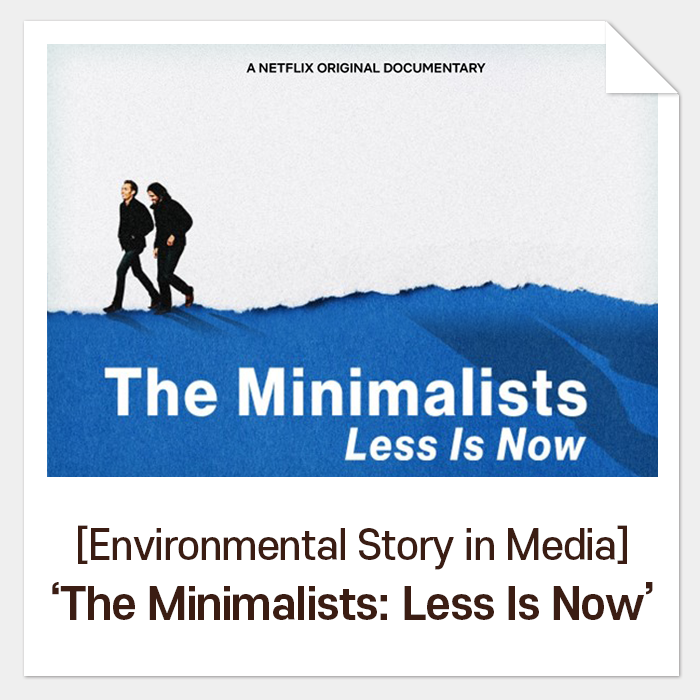[Environmental Story in Media] ‘The Minimalists: Less Is Now’ (2021)

“Less is More, Less is Now!”
‘Are you living an
intentional life?’

Mediaus | <The Minimalists: Less is Now (2021)>
However, after his mother’s death and marriage failure he faced a life crisis, which led to a realization of how obsessive he was with possession that he questioned himself about what he really wants in his life.
Marketings behind intentional spending
The documentary starts with analyzing where the desire for consumption comes from. In the United States, companies spend about $240 billion on advertising each year. These advertisements are deeply located everywhere in our lives and made with intelligence and prediction of algorithmization data, which collects data to study people’s consumption propensity and life patterns.
Also, online shopping platforms like Amazon in the United States; JD.com in China; and Coupang in South Korea have a fascinating logistics system that consumers can receive their orders just a few hours after placing an order and this instigates perpetual consumption.

A scene from <The Minimalists: Less is Now (2021)>
Milburn said, “Look around your house. If you get more of the wrong thing, it becomes less.” He talks about how he was able to find the sense of freedom and profound meanings behind things that can fulfill his life when he got rid of stuff with ‘desire’ and only left stuff that had a distinct purpose.

A scene from <The Minimalists: Less is Now (2021)>
The power of emptying, the power of minimalism
In the beginning of the documentary, the interviewees answered a question of “How might your life be better with less?” And they answered that they found freedom and happiness though living a simpler life with “emptying out.”
Moreover, they even regained self-esteem and fulfillment. Accumulation of stuff does not define us and does not make us happy, rather a few “things” that reflect our lives are worthier and give us the sense of freedom. In other words, when the purpose of owning that stuff disappears, it becomes unnecessary.

A scene from <The Minimalists: Less is Now (2021)>
The reason for recommending this documentary is that it not only talks about how minimalism is living a simpler life by organizing stuff externally, but furthermore, to give us a message to becoming a minimalist to grow inner power by having a community.
Thus, it is impressive to see the minimalists in the documentary leading their life with a consistently altruistic sense of community rather than making selfish consumptions by managing their intentions, not by their desires.
How to live an intentional life
Everyone wants to live their life intentionally as a way of pursuing happiness.
In the film, the two minimalists, Joshua Milburn and Ryan Nicodemus, describe their own principles as a method that one can use to begin minimalism. Milburn got rid of one thing a day for 30 days, whereas Nicodemus packed all his stuff as he would move, then only took out things that he really needed in his daily routine for 3 weeks. As a result, 80% of Nicodemus’s stuff still remained in the box.
These might be two different methods but both come to a realization that accumulation of stuff means neither satisfaction nor happiness, but instead just filling up the space. They encourage us to donate, sell or recycle the things you don’t need.

A scene from <The Minimalists: Less is Now (2021)>
However, if you want to face the rather philosophical but essential question of ‘Am I living an intentional life in this capitalistic society?’, I highly recommend this film. You might find yourself immersed in thoughts after watching.
If you look at it from just a slightly different angle, this documentary can also be introduced as an environmental film. Using necessary items and resources according to their purpose is not only to provide a healthier lifestyle but also for the greater good of the global environment.
If you want to manage your intentions and find the sense of freedom from all temptations of consuming, ‘The Minimalists: Less is Now (2021)’ can be the turning point of your life.



Comments
Post a Comment